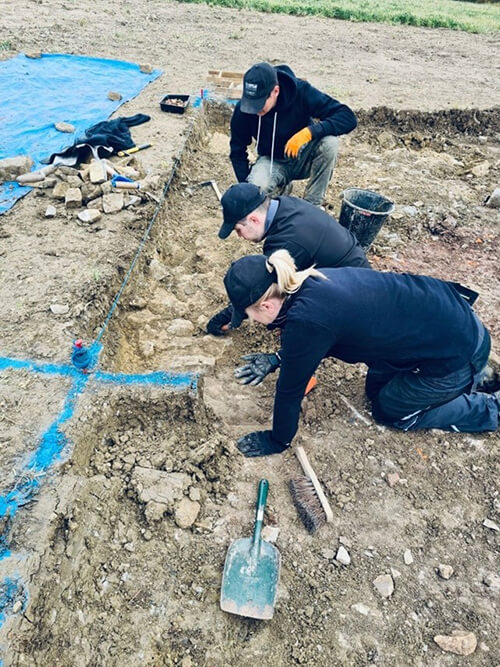
Two very different deployments
University of Greenwich lecturer Sammi Taylor and Forensic Technician Luke Taylor joined efforts in Austria in August 2021 and France in November 2021 to repatriate the remains of military personnel currently classified as missing in action from World War Two. The teams for both deployments were led by Geoscope Services Limited, a group of archaeologists, surveyors and engineers who provide geographical and archaeological data through different services to assist in projects such as these. The efforts themselves were part of the mission of the Defense POW/MIA Accounting Agency (DPAA) to account for Americans who went missing while serving their country. Both deployments involved locating the crash sites of American aircraft and then excavating possible remains from these sites, but Luke explains these were “two very different deployments.” In Austria the crash site was found on a mountain slope at an altitude of 6000 feet and aircraft debris was scattered across a large area of rough terrain.
Meanwhile, at the French site, the crash site was more contained. The team were able to excavate a lot of the aircraft, and they found possible osseous material which will undergo confirmatory identification in the United States. Luke says:
“The fact this deployment came around Remembrance Day made it even more poignant.”
Sammi and Luke praised the locals of the area, who told the team stories while they worked and brought them local produce.
Active practitioners
This is not the first time Sammi and Luke have been involved in such efforts outside of their work at the University of Greenwich. They are both active practitioners in their field, which is a requirement of their certifications.
Sammi became accredited with the Chartered Institute of Archaeologists in 2018 and has assisted with disaster victim identification in high profile cases and has received thanks from the Commissioner of the Metropolitan Police Service for her work. In 2017 she assisted UKDVI with recoveries at the Grenfell Tower fire. Luke, meanwhile, is a certified Forensic Anthropologist (FA-III) and has been an active practitioner in his field for over a decade. He has been involved in high profile death cases, disaster scenes, archaeological excavations, and forensic consultancy.
Sammi’s passions had not always been in this field. It may come as a surprise that she had planned to be a dancer in the West End! Deciding to change paths, she researched science degrees to study at university and, with the support of her parents, she found a course in forensic science that appealed to her. She went on to do a Master’s degree in Forensic Archaeology and Anthropology and was given her first forensics case to consult on not long after she graduated.
Luke, meanwhile, came from “an interest in astrophysics” but, like Sammi, his interests then shifted to forensics. “CSI was popular on TV at the time and my interests grew from the back of that.”
Informing the classroom
During the deployment to France, a live lecture was given from the site. This allowed Forensic Science students to see a real, “unstaged” scene. They were able to see the site and obtain a wealth of information of how an excavation of this scale works.
These deployments, and other projects the duo are involved in, all feed back to how they teach, bringing knowledge and insight into the classroom.
For Sammi, this is important because it helps her gauge student expectations.
I can put into practice what I’ve seen, and it might not be what students have seen in a textbook. Forensic scientists need to be adaptable because no scene is the same.”
Giving something back
For Luke, the deployments have reinforced what he has always felt with forensic science in general – it is an opportunity to help people.
“To have the chance to return family members home, even after so many years like in these deployments… it’s so rewarding. It feels like you’re giving something back. Families can put that chapter to bed.”
The duo hope to be involved in more deployments with Geoscope and the DPAA very soon.



